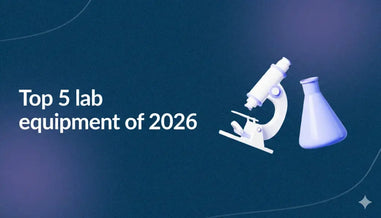- No products in the cart.
The Ultimate Guide to Lab Convection Ovens: Features, Benefits, and Uses
Lab convection ovens are a versatile piece of equipment that can be used for a variety of tasks in the laboratory. They are typically used for heating, baking, sterilizing, and drying materials. Lab convection ovens come in a variety of sizes and features, so it is important to choose the right one for your needs.
Features of Lab Convection Ovens
Lab convection ovens typically have the following features:
- A heating element that heats the air inside the oven
- A fan that circulates the hot air throughout the oven
- A thermostat that controls the temperature of the oven
- A door that allows you to access the oven
- A safety timer that turns off the oven after a set period of time
Benefits of Lab Convection Ovens
Lab convection ovens offer several benefits, including:
- Uniform temperature control: Lab convection ovens provide uniform temperature control, which is important for many laboratory procedures.
- Rapid heating: Lab convection ovens can heat up quickly, which saves time and energy.
- Versatile: Lab convection ovens can be used for a variety of tasks, making them a valuable asset in the laboratory.
- Durable: Lab convection ovens are built to last, so you can be confident that they will provide years of reliable service.
Uses of Lab Convection Ovens
The versatility of lab convection ovens makes them indispensable in numerous scientific disciplines. Here are some common applications:

1. Research and Development: Lab convection ovens facilitate the drying and curing of samples, making them ideal for research and development purposes. They are widely used in industries such as pharmaceuticals, food processing, and materials science.
2. Sterilization: Convection ovens are utilized for the sterilization of laboratory equipment, glassware, and media. By subjecting the items to high temperatures, these ovens effectively eliminate microorganisms, ensuring aseptic conditions for experiments.
3. Sample Preparation: Many lab protocols require the removal of moisture from samples, and convection ovens provide an efficient means of achieving this. They are used for drying and desiccation of materials such as chemicals, powders, and biological samples.
4. Heat Treatment: Lab convection ovens find application in heat treatment processes such as annealing, sintering, and tempering. These processes involve subjecting materials to controlled heating and cooling cycles to alter their properties, such as hardness, strength, and conductivity.
5. Environmental Testing: Convection ovens are employed in environmental testing to simulate extreme temperature conditions. By subjecting samples to high or low temperatures, researchers can evaluate their performance and stability in challenging environments.
6. Food Science: Lab convection ovens play a crucial role in food science research and development. They are used for various applications, including baking, cooking, dehydration, and studying food processing techniques. These ovens allow scientists to mimic industrial-scale processes in a controlled laboratory setting.
7. Life Sciences: In the field of life sciences, convection ovens are utilized for incubation purposes. They provide a stable and controlled environment for the cultivation of microorganisms, cell cultures, and the growth of plants.
8. Quality Control: Convection ovens are essential tools in quality control laboratories, where they are employed for testing and validating the stability of products. Stability testing involves subjecting samples to accelerated aging by exposing them to elevated temperatures, simulating the conditions they may experience during storage or transportation.
9. Material Testing: Lab convection ovens are used to assess the physical and chemical properties of materials. They aid in processes such as thermal analysis, moisture content determination, and studying the effects of temperature on materials' behavior and performance.
Choosing the Right Lab Convection Oven
When choosing a lab convection oven, there are a few factors you need to consider, including:
- The size of the oven: You need to choose an oven that is large enough to accommodate the materials you will be heating.
- The temperature range: You need to choose an oven that can heat to the desired temperature.
- The features: Consider the features that are important to you, such as a safety timer or a programmable thermostat.
- The budget: Lab convection ovens can range in price, so you need to set a budget before you start shopping.
Conclusion
Lab convection ovens are a versatile piece of equipment that can be used for a variety of tasks in the laboratory. They are typically used for heating, baking, sterilizing, and drying materials. Lab convection ovens come in a variety of sizes and features, so it is important to choose the right one for your needs.
Here are some additional tips for choosing a lab convection oven:
- Read reviews from other users to get an idea of the pros and cons of different models.
- Consider the size of the oven and the materials you will be heating.
- Make sure the oven has the features you need, such as a safety timer or a programmable thermostat.
- Set a budget before you start shopping.
With a little research, you can find the perfect lab convection oven for your needs.
About Lab Pro
For over 40 years, Lab Pro Inc. has been committed to delivering the highest quality lab equipment such as laboratory convection ovens, hand tools, chemicals, lab supplies, and cleanroom PPE apparel to medical device companies and laboratories worldwide. To learn more, visit the biggest Lab Supply demo room in California, or contact us online or at 888-452-2776.












































